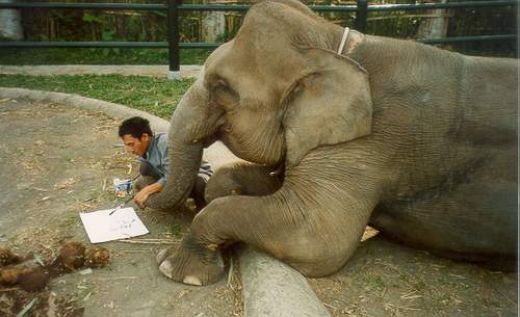
An Asian elephant named Koshik can imitate human speech, saying words in Korean that can be understood by speakers of the language, researchers from the University of Vienna say.
It is unclear why Koshik started mimicking human speech but cognitive biologists Angela Stoeger and Tecumseh Fitch suggest in research published in the journal Current Biology that it might be related to his experiences as a juvenile.
Koshik was the only elephant living at the Everland Zoo in South Korea for about five years in his youth, with only people for company during an important phase for bonding and development.
“We suggest that Koshik started to adapt his vocalizations to his human companions to strengthen his social affiliation with them, something that is also seen in other vocal-learning species and in very special cases, even across species,” said Stoeger.
There have been reports of elephants imitating the sound of truck engines, and a male elephant living in a zoo in Kazakhstan has been reported to say words in Russian and Kazakh, but that case was never investigated by scientists.
Koshik made headlines a few years ago by attracting tourists with his unusual ability, but the researchers have now run tests where they asked native Korean speakers to write down what they heard when listening to recordings of the elephant.
They found that by sticking his trunk in his mouth to help form the sounds, he has a vocabulary of the five Korean words for ‘hello’, ‘sit down’, ‘no’, ‘lie down’ and ‘good’.
Unfortunately, there is no evidence that Koshik understands the meaning of the words he is using.
The researchers noted the following vocal interactions in Korean so you can follow along in the video:
Koshik: “choah” (good)
Trainer: “choah choah annyong” (good good hello)
Koshik: “choah” (good)
Trainer: “choah choah annyong” (good good hello)
Koshik: “choah” (good)
Trainer: “choah choah” (good good)
Koshik: “choah” (good)
Trainer: “annyong” (hello)
Koshik: “choah” (good)
Trainer: “annyong” (hello)